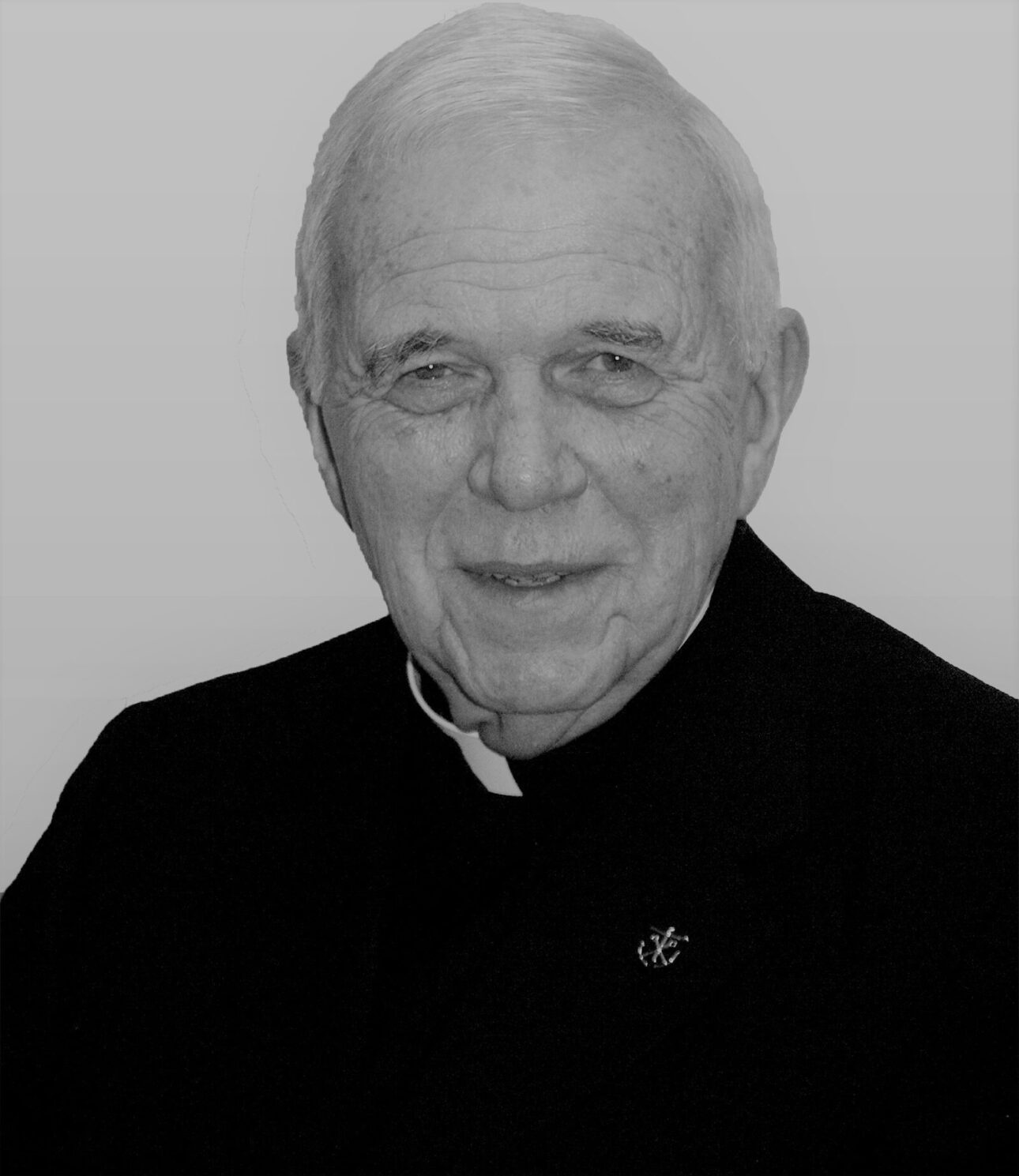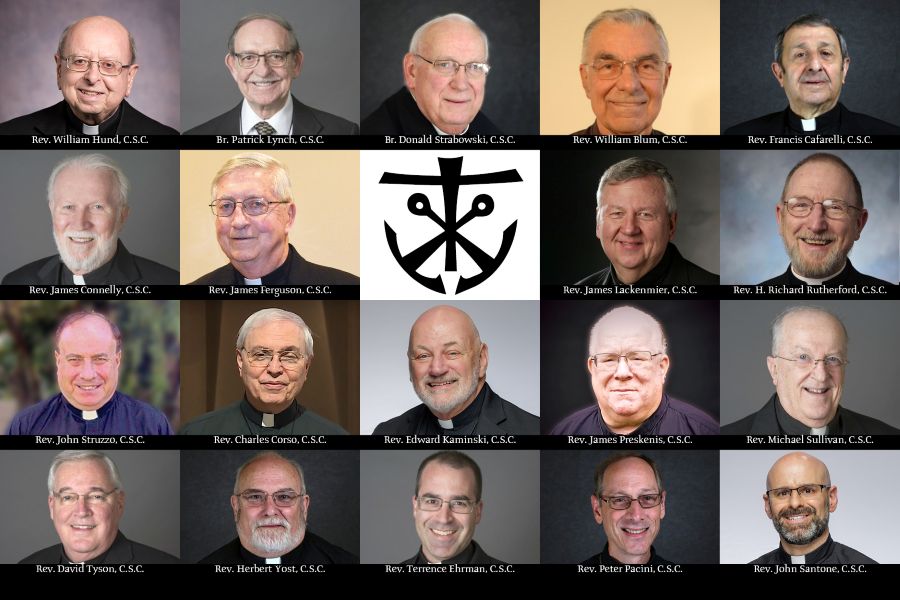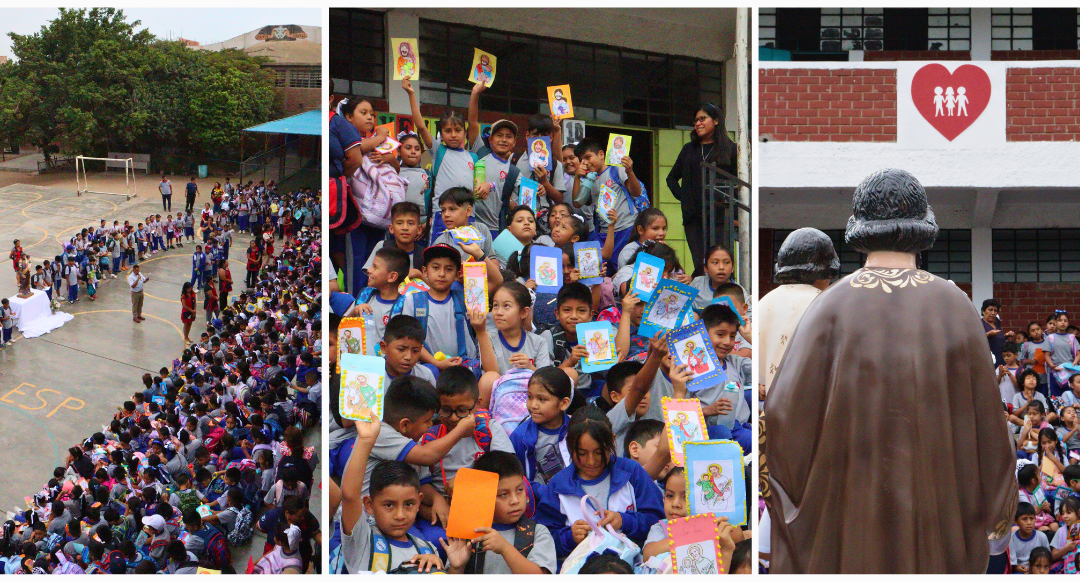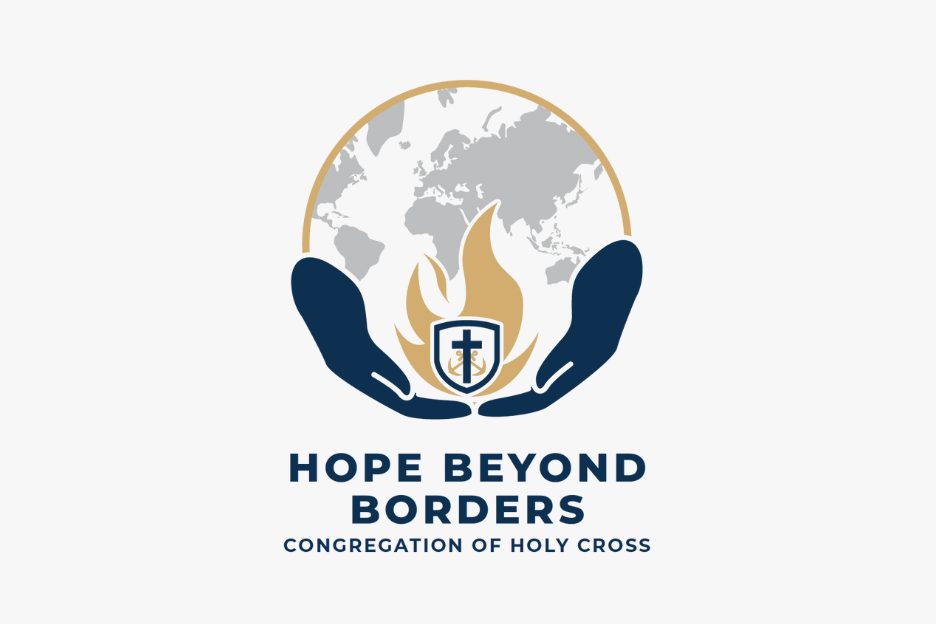
Rev. Michael J. Heppen, C.S.C.
Oct. 14, 1936 – Feb. 4, 2019
NOTRE DAME, Ind. – Rev. Michael Joseph Heppen, C.S.C., 82, died at Holy Cross House, Notre Dame, Ind., on Monday, February 4, 2019.
Watch Fr. Heppen’s Funeral Mass via YouTube.
Fr. Heppen was born on October 14, 1936, in Anderson, Ind., to George A. and Mabel Elizabeth (Meehan) Heppen. He was a 1954 graduate of St. Mary High School. He was received into the Congregation of Holy Cross on Aug. 15, 1955, and made his First Profession of Vows on Aug. 16, 1956. He graduated from the University of Notre Dame in 1959 with a Bachelor’s Degree in Philosophy. He professed Final Vows on Aug. 18, 1959, then studied theology at Holy Cross College, Washington, D.C., from 1959 to 1963 and was ordained to the priesthood in the Congregation of Holy Cross on June 13, 1963.
Fr. Heppen served in pastoral apprenticeship at the University of Notre Dame in 1963 and 1964 while completing an MBA. After receiving his MBA, he taught and was prefect at Notre Dame until 1966. Fr. Heppen was then awarded a Huebner Fellowship and studied at the Wharton School at the University of Pennsylvania from 1966 to 1967, then taught finance at the University of Portland until 1976. He entered the Jesuit School of Applied Theology at Berkeley from 1976 to 1977 then returned to Notre Dame in 1977 as director of student accounts, then director of university housing from 1979 to 1984. From 1984 to 1996, he continued to assist at Notre Dame before taking a sabbatical year in 1996, then serving as associate pastor of Our Lady Queen of Martyrs Parish in Beverly Hills, Mich. until 2003. Fr. Heppen began assisting at the National Shrine of the Little Flower Parish in Royal Oak, Mich. in 2003. He moved to Our Lady of Fatima in Notre Dame, Ind., in 2007; then resided at Holy Cross House, Notre Dame, Ind., beginning December 2017. He also assisted at St. Mark Catholic Parish, in Niles, Mich. from 2009 to 2018.
Preceding him in death are his parents, George and Mabel Heppen; and his two sisters, Sister Marianna Heppen, C.S.C., and Mary Helen Kimmerling. He is survived by many nieces and nephews.
Visitation will be from 3:30 to 7:30 p.m. on Sunday, February 10, 2019 at Moreau Seminary, Notre Dame, Ind., where there will be a Wake Service at 7:30 p.m. The Funeral Mass will be at the Basilica of the Sacred Heart on the Notre Dame campus on Monday, February 11, 2019 at 3:30 p.m. Burial will be in the community cemetery at Notre Dame. Kaniewski Funeral Home, South Bend, is in charge of the arrangements.
Memorial contributions in support of the mission and ministries of the Congregation of Holy Cross can be made to: United States Province of Priests and Brothers, Office of Development, P.O. Box 765, Notre Dame, IN 46556-0765 or online at donate.holycrossusa.org.
Wake Eulogyby Rev. Kevin Grove, C.S.C.
Feb. 10, 2019
On November 22, 1963, the world mourned the death of U.S. President John F. Kennedy. Michael Heppen did as well, a Holy Cross priest at Notre Dame. That afternoon, an undergraduate student, who told Fr. Heppen of the assassination, asked if he would hear his confession. Michael Heppen immediately understood that this was the right response to the tragedy and spent the rest of the afternoon in the confessional—more or less, he recounted—without reprieve. Fifty-five years later, Fr. Michael Heppen was known around this community by our students, graduate students, faculty, and staff as the most regular voice of God’s mercy at the Basilica of the Sacred Heart. Until his health prevented him from doing so, he heard confessions five days a week, sometimes more than once a day. And, he loved it. He never tired of it. And it was inspired not only from that student’s request when JFK died, but also from a conversation that Michael had with Holy Cross religious John Cardinal O’Hara when Michael was a graduate student at Penn Wharton. Cardinal O’Hara had given Michael a piece of advice: to occupy himself above all with the work of his vocation to the priesthood—to a life of sacramental service to the people of God. They were wise words for the young business student; and ones Fr. Michael took to heart during his life and recalled with joy as he found himself ill in his final months.
Fr. Michael’s family first inspired this sacramental vocation in him. And, I add my own welcome to the members of the Heppen family to Moreau Seminary this evening. Michael was proud of his family for many reasons, including his father’s long career at GM. But the greatest inspiration was a vocational one that arose from a graced moment. Michael’s mother grew ill and the family lost her early. Michael remembered going to the hospital as a young man and seeing his father having crawled up in the hospital bed with his mother, holding and embracing her as her bodily health failed. Their sacrament of marriage continued to bless—outwardly, in that moment their son—even from the difficulty of the hospital bed. In addition to his sister Mary Helen, who remained a source of support for Michael all through his life, his sister Patricia, or Patsy, entered religious life with the Sisters of the Holy Cross. She was older than Michael and entered religious life when he was but two years old, but the two of them grew close when Michael arrived at Notre Dame. He would go over to St. Mary’s to visit Patsy, Sr. Marianna. Her witness of religious life and in particular her care for those in formation inspired Michael greatly. And so, as one might hope, Michael’s family formed the first and most inspiring parts of his vocation: Dad, Mom, Mary Helen, and Patsy, Sr. Marianna.
Michael’s own vocation was nurtured here at Notre Dame through the encouragement of Holy Cross Father Kerndt Healy. In addition to regular confession and spiritual direction, Healy gave the young Michael a copy of Romano Guardini’s The Lord. Even in his last months, Michael recounted how much that book changed his young life because it posed a vocational question of him. It claimed who Christ was, is, and will be. Michael explained to me that Guardini effectively asked “This is who Christ is: what are you going to do about it?” That was a watershed moment in Michael’s vocation, of a life lived with Holy Cross, but more important than anything else, a life that held Christ as its center and sought to follow him in good times and in bad.
Michael spent his assignments in religious life at the University of Portland, the University of Notre Dame, the National Shrine of the Little Flower in Michigan, and Our Lady of Fatima House where he offered sacramental assistance at both St. Mark’s in Niles, Michigan and the Basilica of the Sacred Heart. Michael’s work most often concerned administration, but as he recounted these periods of his life both in his writing and in telling of the stories, he was most proud of what he did as a sacramental minister. In those years, he had to think through with Holy Cross the challenges of the implementation of the Second Vatican Council, the recalibration of catechesis in light of the sexual revolution, and he remained in Holy Cross through years when a number of religious left. Yet, in asking Michael to reflect on the labors of his life, his first and repeated comment was that he would do it all over again. And, he would do it all over again in an instant. He explained that, like anyone, he made mistakes in terms of persons, relationships, and job, but his work as a Holy Cross priest and a religious—in short his vocation—was his abiding source of pride and grace.
I only got to know Michael in the last years of his life, but we shared in common a deep respect for the Society of Jesus and the way in which St. Ignatius’ understanding of Christ deeply informed that of our own founder Fr. Moreau. At Wharton, Michael lived with the Jesuits at St. Joseph’s University and it was there that he forged bonds of spiritual direction that transcended apostolates and geography. The Jesuits helped to form in Michael an appreciation of spiritual exercise as well as spiritual direction. Michael continued to provide spiritual direction until the end of his life. That form of accompaniment was yet another authentic mode of living out his own vocation of service.
At Holy Cross House, Michael’s room was a revolving door of students, faculty, and staff. He loved every minute of the attention and was eager to pray and visit with those who came to see him. The chemotherapy meant that for a long time he was unable to smoke his beloved cigars, but he kept his spirit and prayer, even as his physical body continued to weaken. Like the greatest in our congregation, he witnessed to the value of life eternal by testifying to the rest of us how to die well. He did so with joy and with grace. His possessions were no longer of concern and Br. Dennis took care of many of the things he would leave behind. In the end, he kept a cross-stitched pillow near his bed where he could see it. In Notre Dame blue and gold stitching was the phrase of the diaconate ordination rite of service in the Word: believe what you read; teach what you believe; and practice what you teach. The liturgy which consecrated him continued to inspire him unto the end.
In his last months, I asked Michael two questions, his answers to which I will use to end this sermon. First, I asked him what he was the most proud of in his ministry in Holy Cross. The answer was not what I expected and that is why it is so beautiful that I share it. Michael Heppen said that the most important ministry that he had taken up was being the rector of Keenan Hall. The ministry of rector at the University of Notre Dame was one of personal accompaniment and formation in the faith that is unparalleled in higher education. Michael was only a rector for a short time, but he held it up as the most important ministry that he had done. And he continued to admire those who have taken up the post of rector since and continue to accompany our students.
Finally, I asked Michael what he was thinking about as he knew he approached his final days. How was he praying, and what was on his mind? He simply answered that he was praying to Christ, wishing to meet Christ, and waiting to make immediate the relationship he had been fostering incompletely for the whole of his life. Michael’s last prayers and wishes were to Christ—mediator of heaven and earth, whose Sacred Heart is the model and image of religious priesthood in Holy Cross. The man who witnessed Christ’s mercy on the day Kennedy died, each time he entered the confessional, and knew the mercy of our savior himself, pined for that same goodness in his final days.
My brothers and dear friends, we keep this vigil of prayer for one of our confreres who truly yoked his hope to the Cross of Christ. We gather here to pray for the repose of his soul and to comfort one another with words of remembrance. Michael believed fully that the work of Holy Cross, as Fr. Moreau described it, was a work of Christ’s resurrection. Whether in the classroom, the confessional, or administration, Michael Heppen grew into a witness of that hope in Christ.
And so we pray: eternal life grant unto him O Lord; and let perpetual light shine upon him. May his soul and all the souls of the faithful departed through the mercy of God rest in peace.
Funeral Homily by Rev. Paul Kollman, C.S.C.
Feb. 11, 2019
Readings:
Hebrews 4:14-16
Luke 2: 22-35
On behalf of Holy Cross, thank you for being here to celebrate the life and the passing into eternal life of our brother, Fr. Michael Heppen. Our condolences especially to Fr. Mike’s nieces Carlene, Marian, and Patricia and the rest of his family. To all of you in the family: We are grateful to have also had Mike in our religious family for over six decades.
Some of us have known Mike Heppen for many of those decades, and worked with him here at Notre Dame or elsewhere. Others made his acquaintance more recently, having met him perhaps in the confessional, celebrating the mercy of God in the Sacrament of Reconciliation here in the Basilica—something to which Fr. Mike was so dedicated. Regardless of how long or how well we knew him, we gather in gratitude for his life, and for all the good he did, and we gather in supplication for God’s mercy on him and us.
In the Temple, 40 days after Jesus’ birth, Simeon prayed “Now, Master, you have let your servant go in peace, according to your word.” Simeon rejoiced that his “eyes had seen [God’s] salvation…prepared in the sight of all peoples…” My last meaningful exchange of words with Mike Heppen came on the feast of the Presentation of the Lord, February 2, two days before Mike died, when this Gospel is proclaimed. We prayed together this Canticle of Simeon, the Nunc Dimittis. It seemed natural, for Mike was preparing to meet Jesus, like Simeon who had waited all those years to meet “the Christ of the Lord.” I told Mike that Christ was coming for him. He nodded and smiled amid his pain.
Mike Heppen always wanted Christ at the center of his life, and Christ was at the center at its end:
Christ coming to meet him in the Temple of his room in Holy Cross House;
Christ waiting to welcome him into the Temple of the eternal Jerusalem;
Christ the high priest, able to sympathize with all of our weaknesses;
Christ urging confidence in divine mercy and his “timely help”;
Christ, who put all of us on his back as he learned obedience through what he suffered;
Christ, our beginning and our end.
It was a privilege to come to know Fr. Michael Heppen when I was an undergraduate here at Notre Dame, and a further privilege to enjoy his spiritual guidance, first when discerning my vocation in Holy Cross, then in formation as a seminarian. As with so many others, Fr. Mike, or “Hep,” as he was sometimes called, was, with me, wry and witty, ironic and sometimes even sarcastic. He was supportive and challenging, comforting and occasionally exasperating. Hep shared with us who came to know him his own passions: his love for Christ and the Church, for Holy Cross, and for Notre Dame. He listened patiently to our ruminations, and shared his awareness of current events and social issues, such as homelessness, which was growing in the US in those days. Indeed, several times with him and a few other students, I spent nights at a place in downtown South Bend that anticipated and laid the groundwork for the current Center for the Homeless. Fr. Mike shared with us his love for the sacraments, of Eucharist and confession. He shared with us books and ideas and thinkers who inspired him. I was one of many to whom he gave a copy of The Lord by Romano Guardini, a book that had shaped his own formation in Holy Cross. Since then I have come to realize the impact of that book, The Lord, on so many others—Pope Benedict XVI and Pope Francis, among them.
What Mike liked about Guardini’s The Lord was this: Guardini resisted the tendency to pick and choose among Christ’s words and deeds what appealed to us. Instead, he invited readers to embrace friendship with Jesus as Jesus is presented in the Scriptures: Jesus not just the teacher of wisdom but Wisdom itself, not only a dispenser of truth but the Truth. Mike learned that apprenticeship to such a Divine Master, friendship with Jesus, was not for the faint-hearted.
Christ as the Gospels portray him was appealing and exasperating, approachable yet elusive, meeting any of us where we are and then taking us somewhere else, never leaving us unchanged by our encounter with Him. Friendship with Christ was, Mike knew, like any real friendship: dynamic, alive, mysterious. To want to stand in such bright light opens us to searching and self-criticism. It could be searing, to befriend this one called by Simeon “a sign of contradiction,” the one who would be the catalyst for the piercing of his own Mother’s heart.
Mike knew that friendship with Christ meant piercing and puncture for our hearts too, and Mike’s longing for friendship with Christ did not prevent his suffering. He filled and lost important positions, dreamed of other roles that never came his way, felt keen disappointment in himself and other people. To befriend Christ, Mike learned and taught, is demanding, an apprenticeship in self-scouring.
Guardini puts it this way: “To know Christ entails accepting his will as our norm. When we feel this we draw back, startled, for it means the cross…It is better to say honestly: ‘I can’t yet,’ than to mouth pious phrases. Slow there with the large words ‘self-surrender’ and ‘sacrifice,’” Guardini continues. “It is better to admit our weakness and ask him to teach us strength.”Mike learned this.
Our Holy Cross Constitutions put it this way: “We learn that we have it within ourselves to hold back.” Mike knew this. The constitutions also say, “there will be dying to do on the way to the Father.” And Mike experienced deaths large and small, their causes diverse.
Through it all, Christ sympathizes with our weaknesses, and thus with Mike’s; Christ comes to us as we wait, as Christ came to him; Christ awaits us as swords of many sorts pierce our hearts.
As we celebrate Christ’s grace at work in the life of Michael Heppen, let us rejoice in all that Christ did in and through him. And let us re-embrace our own friendships with our Savior.
May we be always on the lookout for new ways to draw close to Christ, and to draw others to Him as well.



